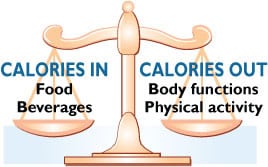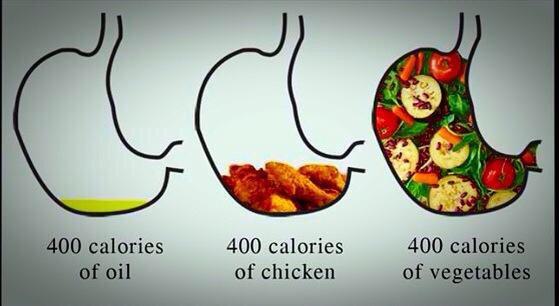Calories: What are those?
Calories are a measure of energy used to measure the energy of everything that we eat or drink. A more accurate definition of a dietary calorie is: “1 calorie is the amount of energy required to increase the temperature of 1 gram of water by 1 degree Celsius.” As we learned in physics classes, the energy is measured in joules, so 1 calorie equals 4,184 joules.
When we say “calories” we usually refer to kilocalories (kcal) or the small calories. One dietary Calorie (written with capital “C”) is the energy required to heat up 1 kilogram of water by 1 degree Celsius. But, for the sake of convenience we use the term “calories” instead of the more technically correct one kilocalorie.
The body uses the energy we get from foods and beverages for essentials task like breathing, moving, eating, thinking etc. Any amount of energy that isn’t used by the body, is usually stored as fat. That being said, if we keep out eating our energy needs, over time we will gain weight.
Counting calories – a waste of time?
We heard quite often that counting calories is pretty much a waste of time. However, achieving our body goals can be summed up to a simple math equation. We have to keep in mind two things: the calories that your body burns in order to function properly (calories out) and the amount of calories that we eat (calories in).

Calories out = calories in -> we maintain our weight
Calories out < calories in -> we gain weight
Calories out > calories in -> we lose weight
It has been proven over the years in scientific experiments that overfeeding results in weight gain.
A calorie is NOT a calorie
The “calorie myth” is one of the most common and damaging myths when it comes to nutrition and healthy eating. It is based on the idea that “a calorie is a calorie” meaning all calories have the same effect on our body regardless of its origin. Of course, there are 2 sides of every story. Technically speaking, all calories do have the same amount of energy, so, in that matter, a calorie is indeed a calorie. But when it comes to our body, things change a little bit.
Imagine our body as a complex biochemical system which in order to provide itself the fuel that it needs, it must use different metabolic pathways for different foods to turn them into energy. Thus, depending on the foods we eat, our body will respond independently. For example, 100 calories of broccoli will have a distinct effect on your body than 100 calories of French fries.
Furthermore, the amount of calories that we burn and the effect of diverse foods on hunger can vary considerably.
<input alt=”” src=”https://healthimpactnews.com/wp-content/uploads/sites/2/2014/12/soda-apple-calories.jpg” style=”width: 500px; height: 250px;” type=”image” />
Calorie density
The calorie density or energy density measures the calorie content of food relative to its weight or volume.

Foods with low calorie density such as vegetables, meat and fish, fruits, milk and yogurt, eggs, starchy carbs, sugar-free drinks(water, coffee, tea) :
- Higher in nutrient density
- Fill the stomach with fewer calories
- Satisfy the hunger drive
Foods with high calorie density(candy and chips, pastries and cakes, fast foods, oils, high-fat dairy, fatty meats, high-fat condiments(mayonnaise i.e), sugary drinks.
- Less nutrients
- More fat & cholesterol
- Less filling – you eat more
A vegetable that contains 30 calories per 100 grams has a low calorie density, while chocolate that contains 550 calories per 100 grams has a very high calorie density.
Choosing foods based on their density it makes eating healthy so much easier because it restrains our food options, eliminating most processed foods that are generally unhealthy and easy to overeat.
How many calories do we need?
The amount of calories that we need on a daily basis depends on many factors such as: age, gender, weight and activity. A young athlete will need a larger amount of calories than an elder who doesn’t exercise. Mainly if we want to gain weight, we need to create a calorie excess by eating more than our body burns off.
There are a bunch of formulas to calculate our energy needs, but thanks to the advanced technology nowadays, there are plenty of apps that can help us track our food intake.
Here are 3 of them:
<input alt=”” src=”https://fun2eatagain.files.wordpress.com/2016/04/img_2228.png” style=”width: 400px; height: 250px;” type=”image” />
Keep in mind
Calories do count, when it comes to losing weight.
The quality of the calories is important so try to choose low-density calorie foods for healthy benefits.
This article has been written by Oana Mocian – Nutritionist
Sources:
https://authoritynutrition.com/calorie-density/
https://authoritynutrition.com/debunking-the-calorie-myth/
https://authoritynutrition.com/counting-calories-101/
DISCLAIMER!
THIS BLOG claims no credit for any images posted on this site unless otherwise noted. Images on this blog are copyright to its respectful owners. If there is an image appearing on this blog that belongs to you and do not wish for it appear on this site, please E-mail with a link to said image and it will be promptly removed.